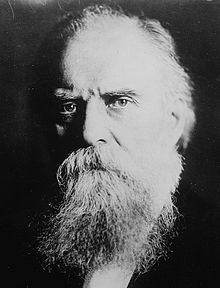Nikolai Tchaikovsky
| Nikolai Tchaikovsky | |
|---|---|
 |
|
| Born | 7 January 1851 (NS)/ 26 December 1850 (OS) Vyatka, Russia |
| Died |
30 April 1926 Harrow, England |
Nikolai Vasilyevich Tchaikovsky (7 January 1851 [O.S. 26 December 1850] – 30 April 1926) was a Russian revolutionary.
Tchaikovsky was born in Vyatka. He spent the first part of his life on his mother's estate, and studied at a public school at Vyatka and later on in St. Petersburg. In 1868, he entered the St. Petersburg University, and got his degree in chemistry in 1872. While studying in St. Petersburg, he joined a radical student group which would later be known as the Circle of Tchaikovsky after its most famous member. The group advocated revolutionary socialist ideals which formed the basis of the Narodnik movement.
But under the political régime of Russia in the 1870s, no public body or society could act freely if its activity was not fully approved by the government. Much effort was expended to suppress the promoters of the Narodnik movement, and Tchaikovsky was twice arrested. Under these conditions the new party soon lost its educational character and became a revolutionary and terrorist association. Tchaikovsky did not approve of this new tendency and joined a social-religious group, which received the name of “God-men” because its members tried to find in themselves a reflection of God. However, they were still followers of Russian Orthodoxy.
In 1874 Tchaikovsky left Russia, and a year later he went to the United States with a small party of men and women who shared his political views and religious feelings. They founded a communistic settlement at “Cedar Vale,” near Wichita, Kansas, and tried to work out their new religious and social teaching. The experiment proved a failure. After two years of hard experience, Tchaikovsky and his friends were obliged to recognize that mankind was not yet ready for the communistic life which they believed to be an imminent development of the future. They regarded communistic life as senseless without a constant feeling of the presence of God in the case of each member of the community, and this essential condition could not be achieved. Therefore, they returned to the “old world of antagonism.” The awakening was especially hard for Tchaikovsky, who not only found it necessary to reconstruct his conception of the world, but had a family to keep and no means of livelihood. He worked for some time as an ordinary workman in a shipbuilding yard and in a sugar factory near Philadelphia. His health broke down and with his family he joined the religious community of the Shakers, where he remained for a year.
...
Wikipedia
